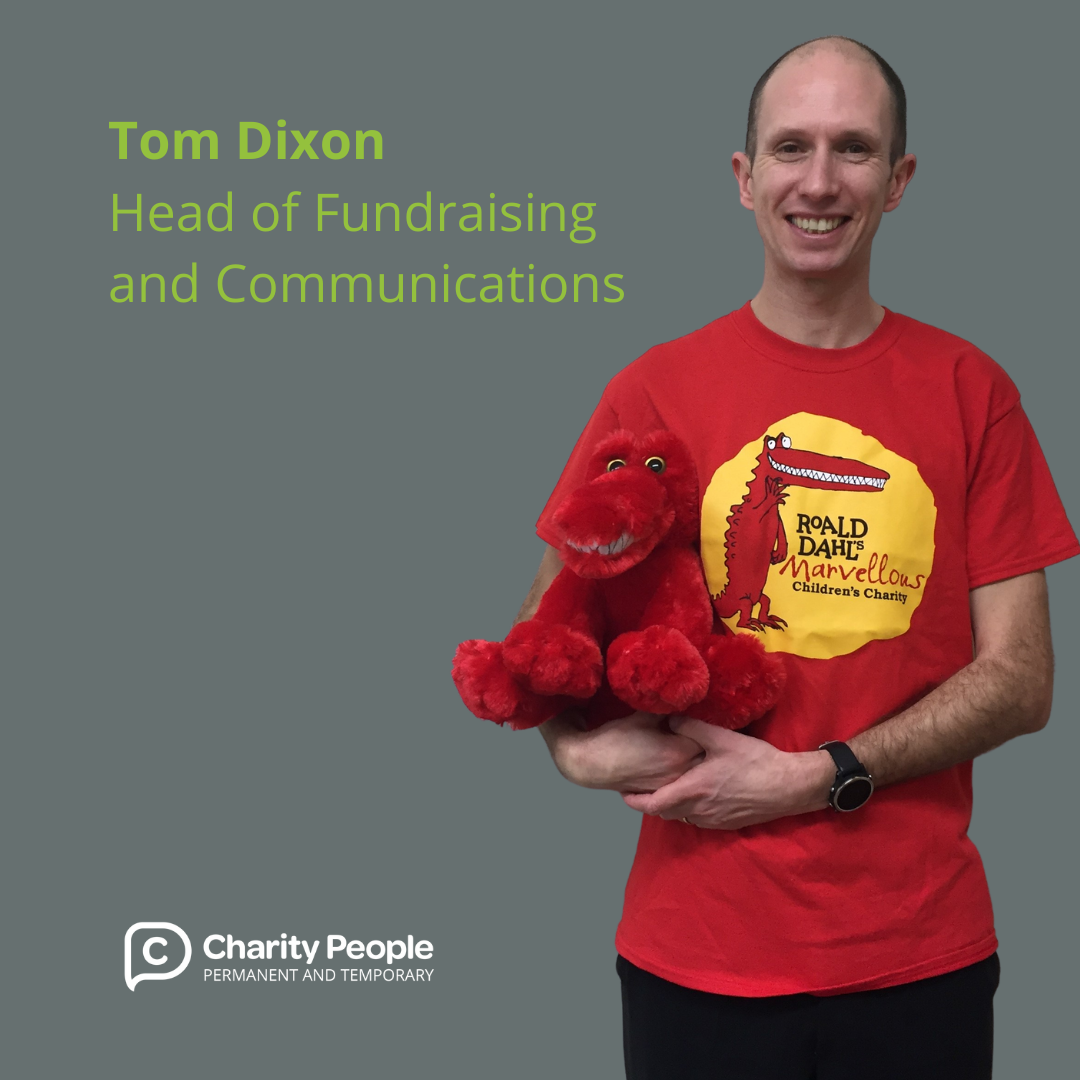by Nick Billingham
I feel very strongly that the purpose of our work at Charity People is to help charities to have better impact by supporting them to create high-performing teams. This means that our work doesn’t end after we place a candidate in a role. It’s been two years since we placed Tom Dixon in a senior leadership role at Roald Dahl’s Marvellous Children’s Charity – time to check in with him and see how he’s doing.
__________
Tell us about Roald Dahl’s Marvellous Children’s Charity and your role there?
Roald Dahl’s Marvellous Children’s Charity provides specialist nurses and support for seriously ill children. Roald Dahl believed in the importance of children and in helping them overcome life’s toughest challenges. He was one of the world’s most imaginative and loved storytellers and we are part of his marvellous legacy. My role is Head of Fundraising and Communications, which, as a small charity means I am involved across the whole organisation. My main focus is fundraising, but I do a lot of comms strategy and support as well as stakeholder management, event creation and finance modelling. It’s a fun and varied role with the added magic of Roald Dahl’s stories to get involved with.
How have you and the team found working remotely during this last year of being in and out of lockdown? Do you think this will change the way you work in the future?
Working remotely has actually been a good thing for our organistion. As a small charity of 10 staff, we were previously pulled all over the country for meetings and events. With no travel and fewer distractions, we have been able to cover a lot more ground, build new relationships, develop funding partnerships and create a more stable and focussed organisation. Of course there are draw backs with the team being more distant from each other, but it has been helpful to have a more strategic focus. It will definitely change the way we operate in the future and we have already downsized our office to a much smaller and cheaper building that only accommodates around half the team. That means home working will be a feature of our future, but it means we have been able to cut our office and facilities overheads by around 65% which is huge.
One down side is that we can’t go and meet the nurses that we work with or the children that we support – It is so motivational to hear the impact of our work first hand. We have been able to arrange some video calls, but It’s not quite the same.
It’s been two years since you secured the role there, what has been the highlight during that time?
We worked really well as a team to launch a nurses funding appeal and a COVID emergency appeal last May. It was a lot of hard work but we secured celebrity support, some good press and lit up London Picadilly with our key messages, including one of our case studies and nurses. Not only was it a successful period for us, but it also showed how we could operate as a high-performing team to have maximum impact for our beneficiaries.
What are you most proud of during your time with the organisation?
The point where we are now in January 2021. Having weathered some strategic and stakeholder storms in the past two years, built up a stable team and had some good success, it feels like we are in a great position to launch ourselves forward over the next few years. It’s an exciting feeling, especially as we’ll continue to put ourselves into a better and better position to help more seriously ill children and their families than ever before.
What is the biggest lesson you have learned along the way?
Coming in new to the role, I focused too much on strategy and not enough on quick fundraising wins. It took a while to gain traction and success, and I feel I could have done that earlier. Also, the focus that the pandemic has brought is a lesson for any time. Prioritising the important tasks over the urgent ones, seeing them through to completion and then moving on. It’s difficult to constantly have a lot of plates spinning at once.
What has been the most challenging part of your role there? (and how have you overcome that?)
Stakeholder management is difficult for an organisation like ours with a lot of history and a lot of expectation. I think fundraisers are naturally great at relationship management and we have focussed a lot of effort on strengthening key relationships. It has paid dividends and made the job really enjoyable.
And what are your plans for your team in the future?
We will continue to focus on our core roles and bed-in a lot of our new plans and processes. We are still in the forming phase and will begin to really perform once we have delivered on more of our plans. Keeping the team together is a big part of what our senior leadership team wants to achieve so we will ensure that the team are well supported and are still able to make time for learning and development to ensure they continue to grow in their careers. Keeping motivation levels up is important and ensuring that we get access to cause related stories and content is crucial.
_________
As Tom suggests, ensuring long-term satisfaction in a role is crucial to retaining staff, consistency in performance and the ability to have an impact. There is so much for us to learn a couple of years on about the charity and the person we have placed with them. It’s really satisfying to follow the journeys of the organisations we work with and support the careers of the people we place with them.


